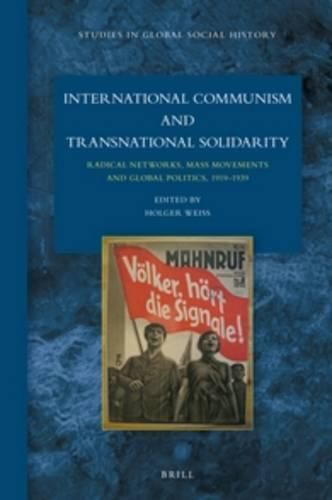Readings Newsletter
Become a Readings Member to make your shopping experience even easier.
Sign in or sign up for free!
You’re not far away from qualifying for FREE standard shipping within Australia
You’ve qualified for FREE standard shipping within Australia
The cart is loading…






This book provides an analysis of the articulation and organisation of radical international solidarity by organisations that were either connected to or had been established by the Communist International (Comintern), such as the International Red Aid, the International Workers’ Relief, the League Against Imperialism, the International of Seamen and Harbour Workers and the International Trade Union Committee of Negro Workers. The guiding light of these organisations was a radical interpretation of international solidarity, usually in combination with concepts and visions of gender, race and class as well as anti-capitalism, anti-imperialism, anti-colonialism and anti-fascism. All of these new transnational networks form a controversial part of the contemporary history of international organisations. Like the Comintern these international organisations had an ambigious character that does not fit nicely into the traditional typologies of international organisations as they were neither international governmental organisations nor international non-governmental organisations. They constituted a radical continuation of the pre-First World War Left and exemplified an attempt to implement the ideas and movements of a new type of radical international solidarity not only in Europe, but on a global scale.
Contributors are: Gleb J. Albert, Bernhard H. Bayerlein, Kasper Brasken, Fredrik Petersson, Holger Weiss.
$9.00 standard shipping within Australia
FREE standard shipping within Australia for orders over $100.00
Express & International shipping calculated at checkout
This book provides an analysis of the articulation and organisation of radical international solidarity by organisations that were either connected to or had been established by the Communist International (Comintern), such as the International Red Aid, the International Workers’ Relief, the League Against Imperialism, the International of Seamen and Harbour Workers and the International Trade Union Committee of Negro Workers. The guiding light of these organisations was a radical interpretation of international solidarity, usually in combination with concepts and visions of gender, race and class as well as anti-capitalism, anti-imperialism, anti-colonialism and anti-fascism. All of these new transnational networks form a controversial part of the contemporary history of international organisations. Like the Comintern these international organisations had an ambigious character that does not fit nicely into the traditional typologies of international organisations as they were neither international governmental organisations nor international non-governmental organisations. They constituted a radical continuation of the pre-First World War Left and exemplified an attempt to implement the ideas and movements of a new type of radical international solidarity not only in Europe, but on a global scale.
Contributors are: Gleb J. Albert, Bernhard H. Bayerlein, Kasper Brasken, Fredrik Petersson, Holger Weiss.